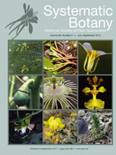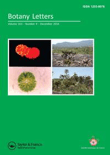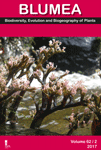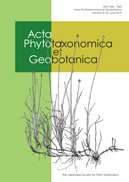
Bangladesh Journal of Plant Taxonomy
Scope & Guideline
Advancing plant taxonomy for a sustainable future.
Introduction
Aims and Scopes
- Plant Taxonomy and Systematics:
The journal emphasizes the classification and naming of plants, including studies on new species, taxa revisions, and systematic relationships among various plant families. - Biodiversity and Flora Studies:
It aims to document and analyze the diverse flora of Bangladesh, including inventories of vascular plants, and studies on specific regions or ecosystems. - Ethnobotany and Medicinal Plants:
Research on the traditional use of plants for medicinal purposes is a core focus, highlighting the ethnobotanical knowledge of local communities. - Molecular Phylogenetics and Genetics:
The journal includes studies utilizing molecular methods to explore genetic relationships and phylogenetic analyses, contributing to a better understanding of plant evolution. - Environmental and Ecological Research:
Investigations into the effects of environmental factors on plant species, including studies on salinity, climate change, and ecological interactions.
Trending and Emerging
- Molecular Characterization and Genomics:
There is a notable increase in studies utilizing molecular techniques for the characterization of plant species, including genome sequencing and phylogenetic analyses, highlighting a trend towards integrating molecular biology into taxonomy. - Impact of Climate Change on Plant Biodiversity:
Research addressing the effects of climate change on plant species and ecosystems has gained traction, reflecting a global concern for biodiversity conservation in the face of environmental changes. - Ethnobotanical Research in Local Contexts:
The exploration of ethnobotanical knowledge, particularly regarding medicinal plants and their uses in local communities, is becoming more prominent, emphasizing the integration of cultural practices within botanical studies. - Ecological Studies on Plant Interactions:
Emerging papers are increasingly focusing on ecological interactions among plant species, including studies on community structure, biodiversity patterns, and plant responses to environmental stressors.
Declining or Waning
- Traditional Agricultural Practices:
Research on traditional agricultural practices and their impact on plant diversity has decreased, possibly due to a growing interest in modern agricultural techniques and biotechnology. - General Flora Surveys without Specific Focus:
More generalized flora surveys that do not delve into specific taxonomic or ecological aspects have become less common, as researchers increasingly aim for targeted studies with detailed methodologies. - Invasive Species Studies:
Papers focusing on the impacts of invasive species on local flora have diminished, indicating a potential shift towards more pressing issues such as climate change and habitat degradation.
Similar Journals

SYSTEMATIC BOTANY
Illuminating the Path of Plant EvolutionSystematic Botany, published by the American Society of Plant Taxonomists, is an esteemed journal focusing on the diverse fields of plant taxonomy, systematics, and evolution. With an ISSN of 0363-6445 and an E-ISSN of 1548-2324, this journal serves as a critical platform for researchers aiming to advance our understanding of plant biodiversity and evolutionary relationships. Operating since 1994, Systematic Botany has garnered significant recognition, achieving a Q2 ranking in Ecology, Evolution, Behavior and Systematics, and Plant Science categories, and ranking within the top half of Scopus for Genetics. The journal prioritizes publishing high-quality, peer-reviewed research, making it an essential resource for academics, practitioners, and students alike. Although it does not provide open access options, the journal's robust reputation in both American and international botanical research speaks to its pivotal role in disseminating vital scientific knowledge in the field. For those interested in the latest advancements in plant science, Systematic Botany is indispensable.

TURKISH JOURNAL OF BOTANY
Championing excellence in plant studies.Welcome to the TURKISH JOURNAL OF BOTANY, a prestigious publication dedicated to advancing the field of plant science. Established in 1990 and published by the Tubitak Scientific & Technological Research Council Turkey, this journal serves as a vital platform for researchers, professionals, and students to disseminate their findings and insights on various botanical topics. With an impressive H-index that underscores its academic influence and recognition in the field, the journal is positioned in the Q2 quartile of plant science according to the latest category rankings. The ISSN of the journal is 1300-008X and the E-ISSN is 1303-6106, ensuring broad accessibility in both print and digital formats. As of 2023, it ranks #213 out of 516 in Scopus for Agricultural and Biological Sciences, placing it in the 58th percentile, which highlights its competitive standing among botanical journals. Researchers are encouraged to engage with its open-access options where available, fostering a collaborative and accessible research environment. With its commitment to quality and scientific rigor, the Turkish Journal of Botany remains an essential resource for anyone engaged in the exploration of plant sciences.

Botany Letters
Fostering Global Collaboration in Plant ResearchBotany Letters, published by Taylor & Francis Ltd, is a prominent journal in the field of Plant Science based in the United Kingdom. With its ISSN 2381-8107 and E-ISSN 2381-8115, the journal has established itself as an essential resource for researchers, professionals, and students alike, focusing on innovative studies and findings in botany. As a Q2 ranked journal in its category (2023) and holding a respectable Scopus rank of #200 out of 516 in Agricultural and Biological Sciences, it reflects a robust commitment to quality and relevance in the field. The journal's open access model ensures that groundbreaking research is readily accessible, fostering collaboration and knowledge sharing among the global scientific community. Covering a broad spectrum of topics within plant science from 2016, Botany Letters aims to catalyze advancements in the understanding and management of plant biodiversity and sustainability, ultimately contributing to conservation efforts and agricultural innovation.

TELOPEA
Navigating the Complexities of Ecology and EvolutionTELOPEA is a distinguished scholarly journal published by the Natl Herbarium New South Wales, focusing on the rich fields of Ecology, Evolution, Behavior, and Systematics, as well as Plant Science. With an ISSN of 0312-9764 and an E-ISSN of 2200-4025, the journal has been a significant contributor to the understanding of plant biodiversity and ecosystem dynamics since its inception in 1984, with regular publication resuming in 2006 through to 2024. Residing in the beautiful Australian Botanic Garden at Mount Annan, NSW, TELOPEA operates under a Q3 ranking for both Ecology and Plant Science as of 2023, reflecting its relevance and contribution to these critical scientific disciplines. Though it does not offer open access, the journal remains an essential resource for researchers and professionals seeking to contribute to and stay abreast of the latest developments in plant sciences and ecological research. With a commitment to rigorous peer review and the dissemination of high-quality research, TELOPEA stands as a vital platform for advancing knowledge in the realm of plant ecology and systematics.

BLUMEA
Unveiling the complexities of evolution and behavior.BLUMEA is a distinguished peer-reviewed journal published by RIJKSHERBARIUM in the Netherlands, specializing in Ecology, Evolution, Behavior and Systematics as well as Plant Science. With an ISSN of 0006-5196 and an E-ISSN of 0373-4293, this journal has established itself as a vital resource for academics and practitioners alike since its inception in 1993, with plans to continue through 2024. Currently holding a Q2 quartile ranking in both relevant categories, BLUMEA is positioned as a significant contributor to the advancement of knowledge in its fields, generating innovative research that informs sustainable practices and biodiversity conservation. Although it currently does not offer Open Access options, its insights are critical for those involved in plant sciences and ecological research. Positioned within the Scopus database, the journal ranks at the 41st percentile in Plant Science and the 39th percentile in Ecology, reflecting its substantial impact within the academic community. Researchers, students, and professionals who engage with BLUMEA will find it to be an indispensable source for high-quality research and valuable discussions aimed at shaping the future of ecological studies and botanical science.

KOREAN JOURNAL OF PLANT TAXONOMY
Discovering the intricate tapestry of plant taxonomy.Korean Journal of Plant Taxonomy, published by the Korean Society of Plant Taxonomists, serves as a pivotal platform for researchers and professionals in the fields of plant taxonomy and ecology. With an ISSN of 1225-8318 and a burgeoning E-ISSN of 2466-1546, this journal aims to disseminate high-quality research that contributes to our understanding of plant species diversity, classification, and evolution. Spanning the years from 2018 to 2024, the journal finds its niche within Q3 rankings in both Ecology, Evolution, Behavior and Systematics and Plant Science, reflecting its impactful contributions and relevance in the academic community. The journal's scope encompasses various studies aimed at advancing plant taxonomy in South Korea and globally. By fostering collaboration and sharing groundbreaking research, the Korean Journal of Plant Taxonomy plays a crucial role in shaping the discourse in plant sciences, making it an invaluable resource for students, researchers, and professionals alike, committed to advancing knowledge in this dynamic field.

Acta Phytotaxonomica et Geobotanica
Connecting Researchers through Plant EcologyActa Phytotaxonomica et Geobotanica, published by the Japanese Society for Plant Systematics at the University of Tokyo, serves as a vital platform for advancing research in the fields of ecology, plant science, and biodiversity. With an ISSN of 1346-7565 and an E-ISSN of 2189-7042, this journal not only provides a comprehensive evaluation of current topics within these categories but also addresses the intricate connections between plant systems and their ecological environments. Although currently not open access, the journal is essential for researchers aiming to publish cutting-edge findings, contributing significantly to its classification within the Q3 quartile across multiple disciplines, including Ecology and Plant Science. With an ambitious focus on enhancing the understanding of plant taxonomy and geography through a convergence of research periods from 2014 to 2024, Acta Phytotaxonomica et Geobotanica plays a pivotal role in fostering academic discourse and innovation in plant systematics. Its geographical foundation in Japan enriches the journal's unique perspective on regional flora, making it an indispensable resource for students, researchers, and professionals in the field.

NOVON
Exploring the Depths of Botanical KnowledgeNOVON is a premier scholarly journal published by the Missouri Botanical Garden, focusing on the intersection of botany and taxonomy, particularly within the fields of Ecology, Evolution, Behavior, and Systematics. Since its inception in 1994, NOVON has established itself as a vital resource for researchers seeking insight into plant science and related disciplines, reflected in its Q3 ranking in 2023 within both Ecology and Plant Science categories. With a commitment to advancing knowledge in these dynamic fields, the journal serves as a platform for innovative studies and significant findings. Although it currently operates without an open-access model, NOVON provides valuable contributions to the scientific community, fostering collaboration and dialogue among professionals and students alike. Located in St. Louis, Missouri, the journal plays a crucial role in enhancing our understanding of biodiversity and plant evolution, supporting the overarching objectives of conservation and ecological research.

PLANT SYSTEMATICS AND EVOLUTION
Unveiling the Mysteries of Plant DiversityPlant Systematics and Evolution is a prestigious journal published by Springer Wien, dedicated to advancing research within the fields of plant taxonomy, evolution, and ecology. With its ISSN 0378-2697 and E-ISSN 1615-6110, this journal has been pivotal in shaping the scientific landscape since its inception in 1974. Based in Austria, it occupies a significant position in the academic community, being ranked in the Q2 quartile in both Ecology, Evolution, Behavior and Systematics and Plant Science as of 2023. This high-impact journal is recognized for its rigorous peer-review process and is indexed among the top publications in its category, holding a Scopus rank of #176 out of 516 in Plant Science and #252 out of 721 in Ecology, highlighting its relevance and quality in the research community. Although it does not currently offer open access, the journal is committed to making significant contributions to the understanding of plant biodiversity and evolutionary processes. This makes it an essential resource for researchers, professionals, and students aiming to know the latest developments in the study of plant systematics and evolution.

KEW BULLETIN
Fostering Knowledge in Plant and Ecological SciencesKEW BULLETIN is an esteemed academic journal dedicated to the fields of plant science and ecology, published by SPRINGER LONDON LTD. With an ISSN of 0075-5974 and E-ISSN 1874-933X, it has been a significant resource for researchers and scholars since its inception in 1993, currently covering converged years up to 2024. The journal holds a notable position with a 2023 category quartile ranking of Q3 in Ecology, Evolution, Behavior and Systematics and Q2 in Plant Science, highlighting its contributions to advancing knowledge in these critical areas. Its Scopus ranks—#333 in Plant Science and #475 in Ecology, showcasing a percentile rank of 35th and 34th respectively—further authenticate its standing among peers. While KEW BULLETIN is not an open-access publication, it offers valuable research findings, insightful reviews, and fosters academic discourse, making it an essential platform for professionals, students, and researchers passionate about understanding the intricacies of plant life and ecological systems. Located at 236 Grays Inn Rd, 6th Floor, London WC1X 8HL, England, the journal remains committed to disseminating high-quality research and supporting the scientific community.